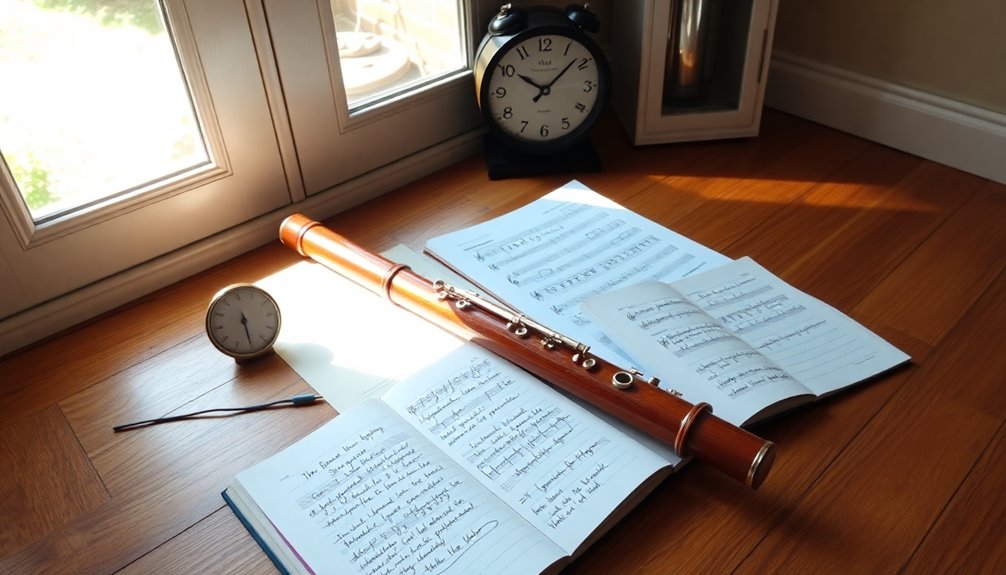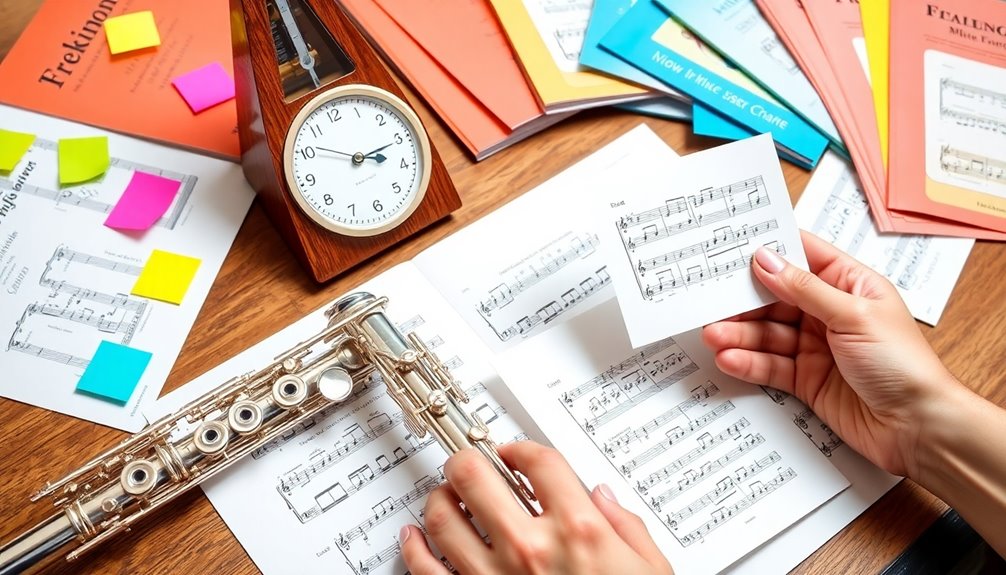To achieve scale proficiency on the flute, start by establishing a daily practice routine. Set specific goals for each session and stick to a consistent schedule. Next, focus on your technique and articulation; relaxed finger placement and regular long tone practice can greatly improve your dexterity and tone quality. Finally, incorporate structured scale exercises into your warm-ups. Use online resources for varied practice, and don't hesitate to engage with fellow musicians for feedback and support. Keep pushing your boundaries, and you'll discover even more helpful strategies to enhance your flute skills.
Key Takeaways
- Establish a consistent daily practice routine focusing on major and minor scales to build foundational skills.
- Incorporate finger exercises and chromatic scales to enhance finger agility and accuracy during scale performance.
- Utilize online resources like apps and videos for diverse scale practice techniques and exercises.
- Experiment with different articulation styles, such as legato and staccato, to add musical expression to your scales.
- Join flute communities for support, shared progress, and motivation in your scale proficiency journey.
Establish a Daily Practice Routine

To get the most out of your flute practice, it's essential to set up a daily routine that keeps you motivated and focused. Start by incorporating goal setting into your practice. Define specific, achievable goals for each session—whether it's mastering a scale or improving your breath control. This not only gives you a clear target but also fosters a sense of accomplishment as you check off those goals.
Next, focus on effective time management. Allocate a specific time each day dedicated solely to practice. Whether it's 20 minutes or an hour, consistency is key. Create a schedule that fits your lifestyle, and stick to it. You might even consider using a timer to guarantee you stay on track, allowing you to concentrate fully on each exercise without distractions.
Remember, it's okay to adjust your goals and practice times as you progress. As you grow more comfortable with your flute, you may want to challenge yourself with more complex pieces or longer practice sessions. The important thing is to remain flexible and make adjustments that keep you excited about your journey. Incorporating visual aids can also enhance your understanding of scales and techniques.
Finally, don't forget to celebrate your achievements, no matter how small. Sharing your progress with fellow musicians can enhance your sense of belonging within the community.
Focus on Technique and Articulation

As you establish a solid daily practice routine, it's time to shift your focus toward honing your technique and articulation. Mastering these elements is vital for playing scales effectively and expressing yourself musically.
Start by paying close attention to your finger placement. Make certain that your fingers are relaxed and hovering over the keys, ready to move fluidly. Practicing finger exercises daily can help build muscle memory and improve your dexterity. Consider playing scales at a slow tempo initially. This will allow you to concentrate on precision and accuracy, solidifying your foundation before you speed up.
Next, let's talk about breath control. Your breath is the engine of your sound, so developing a steady, controlled airflow is indispensable. Take the time to practice long tones, focusing on maintaining a consistent sound. This exercise not only enhances your control but also helps with your overall tone quality. Additionally, incorporating regular practice of chromatic scales can significantly enhance your intonation and finger dexterity.
Articulation is just as important. Experiment with different tongue placements and styles—like legato and staccato—to find what best suits your musical expression. You might try saying "ta" for a crisp attack or "da" for a smoother onset.
Utilize Scale Exercises and Resources

Scale exercises are essential tools for any flutist looking to improve their proficiency. By incorporating structured practice routines into your daily sessions, you can build a solid foundation in scale patterns that will enhance your overall musicality. Start with major and minor scales, focusing on finger exercises that promote agility and accuracy.
These exercises not only develop your technical skills but also strengthen your muscle memory, making it easier to navigate through more complex pieces.
Utilizing online resources can further enrich your practice. There are countless apps, videos, and worksheets available that cater specifically to flute players. Use these resources to explore various scale patterns, and don't hesitate to experiment with different tempos and dynamics. This exploration can keep your practice engaging and help you discover your unique sound.
Incorporate scales into your warm-up routine to guarantee you're consistently developing your skills. Set specific goals for each practice session, whether it's mastering a particular scale or improving your finger technique. Regular practice of scales, arpeggios, and finger technique will ensure you achieve fluency and dexterity in your playing.
Remember, practice doesn't have to be isolating; consider joining a local flute choir or online community where you can share your progress and gain support from fellow flutists.
Ultimately, the key to scale proficiency lies in consistent practice and a willingness to learn. Embrace the journey, and let the joy of music fuel your dedication. You're not alone in this; everyone in the flute community is rooting for your success!
Frequently Asked Questions
How Long Should I Practice Scales Each Day?
When you're figuring out how long to practice scales each day, aim for about 15 to 30 minutes. This scale duration allows you to build muscle memory without feeling overwhelmed.
Practicing frequently, ideally five to six days a week, helps reinforce what you learn. Remember, consistency is key!
What Are the Benefits of Playing Scales in Different Octaves?
Imagine you're jamming with friends, and you nail a solo that showcases your incredible octave range.
Playing scales in different octaves boosts your finger agility and helps you navigate the instrument with ease. It strengthens your muscle memory, allowing you to hit those high notes without hesitation.
Plus, mastering various octaves can enhance your overall sound and confidence, making you feel more connected to your music community and performances.
Keep practicing!
Should I Practice Scales With a Metronome?
Yes, you should practice scales with a metronome! It helps you develop a steady tempo and improves your rhythmic variations.
By incorporating metronome techniques, you'll enhance your timing and precision, making you a more confident musician.
Don't be afraid to start slow and gradually increase the speed as you become comfortable.
How Can I Stay Motivated to Practice Scales?
Imagine the thrill of effortlessly flowing through your scales, each note painting a vibrant picture in the air.
To stay motivated, set clear goals for your practice routines. Break down your sessions into manageable chunks, celebrating small victories along the way.
Join a community of fellow musicians who share your passion; their encouragement can lift you when you need it.
Can I Use Backing Tracks While Practicing Scales?
Absolutely, you can use backing tracks while practicing scales! They add a fun element and help you focus on rhythm variation.
By playing along with tracks, you'll improve your timing and musicality, making practice more enjoyable. Plus, it creates a sense of belonging as you connect with the music.
Conclusion
By establishing a daily practice routine, focusing on your technique, and utilizing various scale exercises, you'll not only improve your flute skills but also discover the joy of music in unexpected ways. Coincidentally, as you refine your scales, you might find that your creativity flourishes, leading to new interpretations of your favorite pieces. Embrace this journey; every note played brings you closer to mastery and a deeper connection with your instrument. Keep pushing your boundaries and enjoy the music!






